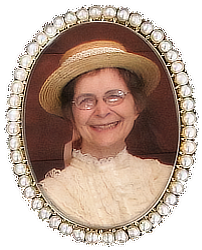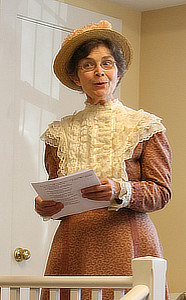
Played by Reverend Deb Knowlton
Sarah Abby Gove
I owned a house, in Hampton Falls, NH, known as Elmfield, where Whittier and his mother visited many
years before. I am also a Quaker, and attended the Amesbury Friends Meeting House as did Whittier.
In 1892, in poor health and not feeling that he had the strength to go to Center Harbor for a vacation as
he loved to do, he came to stay with me, trying to avoid the "Pilgrims" (you may call them Paparazzi
today). He was hoping they would not find him here and he could relax.

From his room on the second floor he could see the seashore. Whittier died of a massive stroke in my
home on September 7, 1892. With his passing, one of the most beloved of the "fireside poets" was gone.
One of Whittier's favorite poems,
Telling the Bees, explains an old custom brought to New England
from Europe requiring that the bees be informed of a death in the family. The hives were dressed in
mourning, covering them with black cloth, to prevent them from swarming to a new home.
Here is a section from
Telling the Bees:
Before them, under the garden wall,
Forward and back,
Went drearily singing the chore girl small
Draping each hive with a shred of black.
Trembling, I listened: the summer sun
Had the chill of snow;
For I knew she was telling the bees of one
Gone on a journey we all must go!
Then I said to myself, "My Mary weeps
For the dead today;
Haply her blind old grandsire sleeps
The fret and pain of his age away."
But her dog whined low; on the doorway sill,
With his cane to his chin,
The old man sat; and the chore-girl still
Sung to the bees stealing out and in.
And the song she was singing ever since
In my ear sounds on:
"Stay at home, pretty bees, fly not hence!
Mistress Mary is dead and gone."
Note. Whittier's funeral was held in his Amesbury home on a cloudless September day that had a touch of
autumn in the air. The viewing was in the parlor where flowers were spread from floor to ceiling. The
service was in the beloved garden. There was simplicity of speech as the Quakers only got up when they
were moved to talk. There was no set program, only spontaneous, sincere words from the heart.
The Hutchinson Singers sang. They were once the most popular close-harmony singing group of the time
and were known for singing Whittier's poetry put to music. A huge delegation of writers and lifelong
friends came by train and occupied a place of honor. Those special guests included the following of "his" women": Mary Abigail Dodge, Annie Fields, Sarah Orne Jewett, Phoebe Woodman, Elizabeth Stuart Phelps Ward, Elizabeth Whittier Pickard, Lucy Larcom, Celia Thaxter, and Sarah Abby Gove.
A hearse and fifteen hacks made its way to Union Cemetery in Amesbury, where he was buried in the
family plot.
Celebrating one hundred years after his birth in 1907, the towns of Amesbury, Haverhill, Old Newbury,
Boston, Danvers, and others, including Hampton, held wonderful commemorative festivals. In Hampton
the Monday Club was responsible for putting on a celebration.
At the Amesbury Town Hall, Booker T. Washington was the guest speaker. Washington was the
President of the Tuskegee Institute, educator, author, and orator, and considered the foremost AfricanAmerican at the turn of the century. Amesbury was to be known as the "home of the poet of
Emancipation."
Likewise in 2007, a year-long celebration sponsored by the volunteers and members of the Whittier
Home in Amesbury was held throughout many venues in town where John Greenleaf Whittier was the
honoree. Poetry readings, teas, exhibits, and displays of Whittier memorabilia were shown to
enthusiastic audiences. In Haverhill there was a 24-hour poetry vigil through a raging snowstorm (think
of Snowbound!) There was a "birthday party" at the Haverhill Library, where he once had been a
trustee. The birthday cake was five feet long by three feet wide, weighing 457 pounds. On the top was a
model of the birthplace, barn, and sheds.
I would like to extend my sincere thanks to the volunteers who read these cameos and to all those who
helped to make it a pleasurable afternoon. I hope that you enjoyed the program and I'd like to say that:
"I consider myself as one of Whittier's women."
Elly Becotte




 Played by Reverend Deb Knowlton
Played by Reverend Deb Knowlton
 From his room on the second floor he could see the seashore. Whittier died of a massive stroke in my
home on September 7, 1892. With his passing, one of the most beloved of the "fireside poets" was gone.
One of Whittier's favorite poems, Telling the Bees, explains an old custom brought to New England
from Europe requiring that the bees be informed of a death in the family. The hives were dressed in
mourning, covering them with black cloth, to prevent them from swarming to a new home.
Here is a section from Telling the Bees:
From his room on the second floor he could see the seashore. Whittier died of a massive stroke in my
home on September 7, 1892. With his passing, one of the most beloved of the "fireside poets" was gone.
One of Whittier's favorite poems, Telling the Bees, explains an old custom brought to New England
from Europe requiring that the bees be informed of a death in the family. The hives were dressed in
mourning, covering them with black cloth, to prevent them from swarming to a new home.
Here is a section from Telling the Bees: